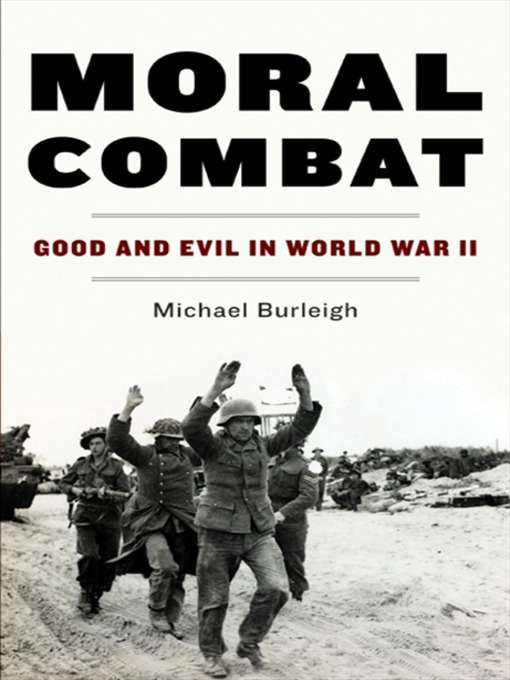First, a small preamble to this post. I have no special expertise in foreign policy. I'm just a guy who watches and reads the news, and who has been trying to make sense of the ongoing debate (which apparently has been resolved, sort of), as to whether the West should intervene in the Syrian Civil War. Last week I posted a review here of UK historian Michael Burleigh's book Moral Combat, an ethical study of good and evil in World War Two. I suggested in my review that Burleigh makes the case that it is still possible to think about war with moral clarity. Thinking of Burleigh in light of what's going on in Syria set this post in motion.
As the death toll climbs towards one hundred thousand in Syria, and some political figures in the West are comparing this moment to our moments of shame in the 1990s when we did nothing in Rwanda or Bosnia, I've been wondering if it is possible to speak coherently of good and evil in the Syrian conflict, and whether there is a moral case for the West to intervene.
Last week Aaron Miller wrote that while the present moment shows much peril in any Western (which in practice wouuld be mostly American)intervention, there is also the fear that history will look back and judge this moment, like Rwanda and Bosnia, a moral failing. "From where we sit today, it is easier to reach the conclusion that Syria is a trap for America. But once Obama's term concludes, there will be a different evaluation. People will forget the details and circumstances --they will only see the dead and the wounded, the refugees and the physical devastation. They will want to know why America wouldn't or couldn't do more. And that's partly why the pressure to do something will grow. Obama knows that Syria is the key story line in the so-called Arab Spring and that his own legacy will suffer unless he moves to counteract the negative appraisals currently gathering force. So, does he want to share the legacy of the last Democratic president, who failed to intervene in Rwanda and almost in Bosnia, too?"
There are lots of military reasons why intervention at the level of the no-fly zone would be a bad idea. It may very well be that the West has shot its bolt in Iraq and Afghanistan, and now has neither the force, the money, nor the political will to project much strength into the region. Nevertheless, as of this weekend, with US President Obama's decision to start arming the Free Syrian Army, it now appears that we are taking some steps into the conflict.
Leaving aside questions of how we proceed tactically, there is still time to ask why we should proceed. Is there an ethically compelling case for acting? The best, and most depressing, Syria analysis I've seen yet on FP comes from Marc Lynch. His article is well worth reading, but here's a quick summary. If the West wants to be idealistic, that is, if we are truly interested in ethics and humanitarian relief, then the only way to end the war and save more lives is to deal with Assad and his backers, including Iran and Russia, to bring about a peace that would allow the Assad regime to survive in some form. Such a policy might be a "stunning success" in terms of ending the fighting. allowing some return of refugees, and opening the door to rebuilding and redefining of boundaries, but from a realist point of view, it would be an "epic disaster" that would strengthen the position the Syria-Iran-Hezbollah triangle and weaken Israel's position.
From a realist point of view, Lynch says, the best thing to do would be to strengthen the rebels and prolong the war, thus bleeding our rivals. "From this perspective, Hezbollah's entry into the fray and the fall of Qusayr are not necessarily a bad thing -- Washington now has an opportunity to strike directly at one of Iran's most valuable assets in the Middle East. The enemy's queen, to use a chess metaphor, has now moved out from behind its wall of pawns and is open to attack. Fear of a rebel defeat -- and of a victory for Hezbollah and Iran -- should squeeze more cash and military support out of the Arab Gulf, Europe, and the United States." Unfortunately, this view pretty much guarantees more deaths, more displacement, and the spread of sectarian conflict between Sunnis and Shias throughout the Middle East. This course of action leads to a future of proxy warfare in the middle east for a generation, and from a humanitarian point of view is morally bankrupt.
So we have two depressing options. Idealism says to pursue a diplomatic, humanitarian solution at the expense of regional security and the balance of power. Realism says we should stoke a proxy war that will kill more people and further destabilize the region, and hope that by degrading our rivals something better might emerge.
To resolve this dilemma, I thought I would go back to Michael Burleigh thinks about Syria. His most recent comment, from April of this year, wasn't encouraging. Speaking of his own country, the UK, he writes, "Cameron’s government is once again full of moralising outrage, raising fears that it might soon be willing to send our war-weary forces into yet another hopeless conflict in the Middle East. Why this sectarian civil war concerns us, rather than Arab armies we regularly equip with billions of pounds worth of high-tech weaponry, remains a mystery to many British people. And if [we send] in troops, the result would be nothing less than a catastrophe." Clearly, Burleigh does not think this is an historic moment to rival Munich.
It may well be that, as Conrad Black wrote in yesterday's National Post, only the peoples of the region, Turks, Persians, and Arabs, can sort out the future of the region, and if so, the most we can do is to provide humanitarian aid where possible. I wonder, though, if that pragmatism will be enough for the ghosts of Rwanda and Bosnia, whose presence, however insubstantial, still haunts us as we debate what we should do in Syria.
For Christians, I think our responses to this terrible situation are somewhat more straightforward. There remain almost a million refugees from this war and their numbers seem to be increasing. Several of the denominational magazines that come across my desk now feature advertisements appealing for donations to organizations working with presons displaced by the war in Syria. As the Canadian Presbyterian magazine put it, indifference is not an option. Besides supporting these organizations as part of our own stewardship, we need to remind our elected representatives that the cause of displaced persons matters to us. Now is also a good time for Christians to reach out to local Moslem communities, and pray with them. Finally, we need to pray for our leaders, that God give them the courage and the wisdom to choose peace over the temptations of realism, security, and war without end.










